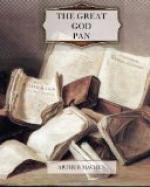Mr. Villiers paused for a moment.
“I have always been rather fond of going over empty houses; there’s a sort of fascination about the desolate empty rooms, with the nails sticking in the walls, and the dust thick upon the window-sills. But I didn’t enjoy going over Number 20, Paul Street. I had hardly put my foot inside the passage when I noticed a queer, heavy feeling about the air of the house. Of course all empty houses are stuffy, and so forth, but this was something quite different; I can’t describe it to you, but it seemed to stop the breath. I went into the front room and the back room, and the kitchens downstairs; they were all dirty and dusty enough, as you would expect, but there was something strange about them all. I couldn’t define it to you, I only know I felt queer. It was one of the rooms on the first floor, though, that was the worst. It was a largish room, and once on a time the paper must have been cheerful enough, but when I saw it, paint, paper, and everything were most doleful. But the room was full of horror; I felt my teeth grinding as I put my hand on the door, and when I went in, I thought I should have fallen fainting to the floor. However, I pulled myself together, and stood against the end wall, wondering what on earth there could be about the room to make my limbs tremble, and my heart beat as if I were at the hour of death. In one corner there was a pile of newspapers littered on the floor, and I began looking at them; they were papers of three or four years ago, some of them half torn, and some crumpled as if they had been used for packing. I turned the whole pile over, and amongst them I found a curious drawing; I will show it to you presently. But I couldn’t stay in the room; I felt it was overpowering me. I was thankful to come out, safe and sound, into the open air. People stared at me as I walked along the street, and one man said I was drunk. I was staggering about from one side of the pavement to the other, and it was as much as I could do to take the key back to the agent and get home. I was in bed for a week, suffering from what my doctor called nervous shock and exhaustion. One of those days I was reading the evening paper, and happened to notice a paragraph headed: ‘Starved to Death.’ It was the usual style of thing; a model lodging-house in Marylebone, a door locked for several days, and a dead man in his chair when they broke in. ‘The deceased,’ said the paragraph, ’was known as Charles Herbert, and is believed to have been once a prosperous country gentleman. His name was familiar to the public three years ago in connection with the mysterious death in Paul Street, Tottenham Court Road, the deceased being the tenant of the house Number 20, in the area of which a gentleman of good position was found dead under circumstances not devoid of suspicion.’ A tragic ending, wasn’t it? But after all, if what he told me were true, which I am sure it was, the man’s life was all a tragedy, and a tragedy of a stranger sort than they put on the boards.”




